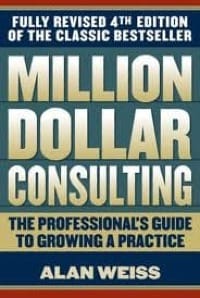New Book Review: "Million Dollar Consulting"
New book review for Million Dollar Consulting: The Professional's Guide to Growing a Practice, by Alan Weiss, McGraw-Hill, 2009:


In his text "Million Dollar Consulting: The Professional's Guide to Growing a Practice", Alan Weiss concentrates on providing advice to those individuals seeking to build a small, private consulting practice. Weiss repeats this refrain on several occasions throughout his discourse here, because as he indicates, a high number of individuals have asked him to expand his training materials over the years to address the growth of the individual practice.
This focus contrasts with works written by David H. Maister, such as "Managing the Professional Service Firm" and "First Among Equals: How to Manage a Group of Professionals" (see my reviews), for example, and Weiss is very explicit as to the reasons behind this focus: "Unless you have a personal objective to build a large firm, surround yourself with the accoutrements of size and mass, and build the equity in the company to the point where you own a valuable business (or a share in one), there is no intrinsic personal financial benefit in linear growth." And "if your objectives are to earn a high income while helping clients to improve their condition – in other words, to support your family and your aspirations while engaging in constructive and valuable work – then your chances of fulfilling this goal are immeasurably greater if you are running your own small firm (small meaning just you or with a few others). You don't have to wait years for a portion of the ownership because you already have all of it. You are not reliant on colleagues' productivity or management's strategic decisions, and you absolutely control how much money you keep."